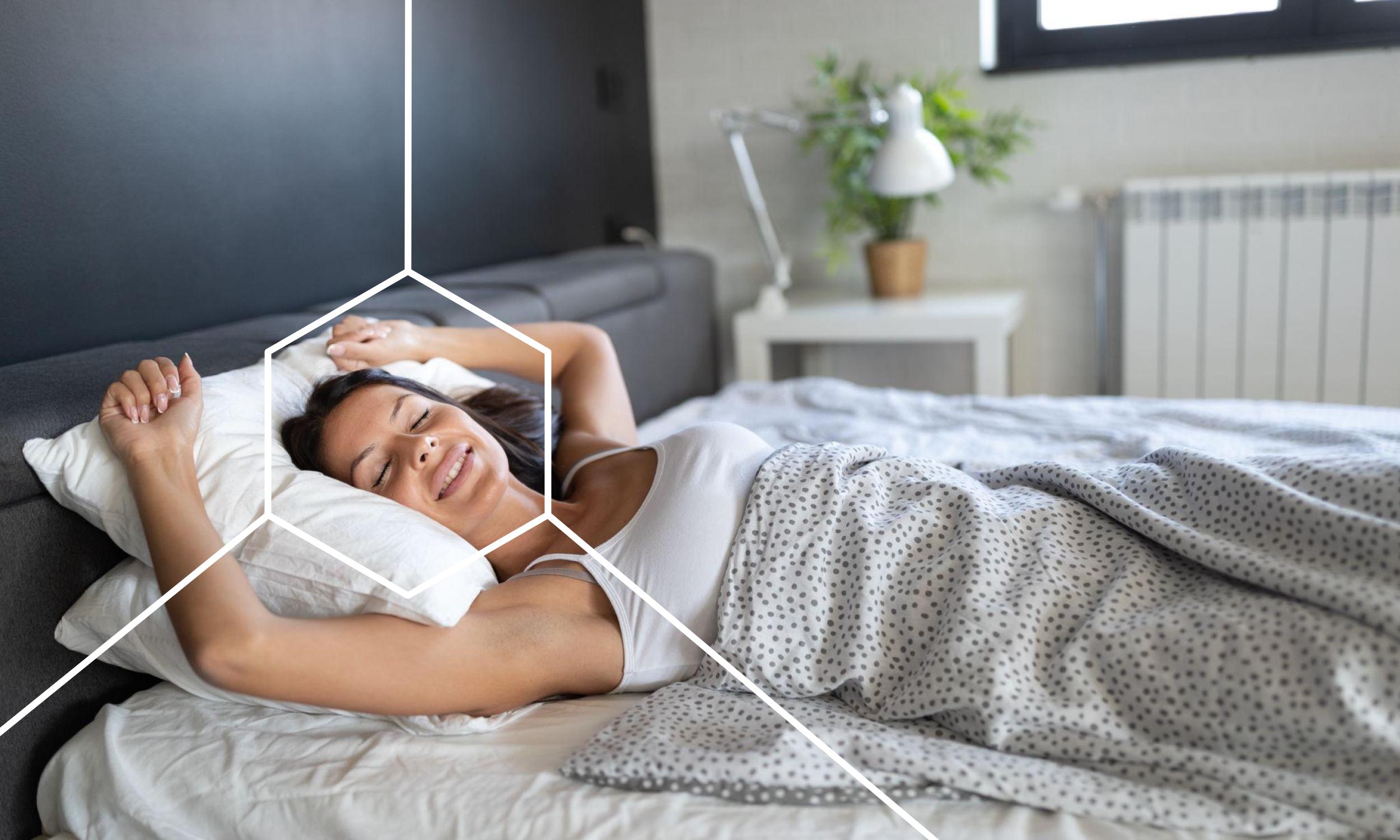
Did you know that sleep can help your skin look better! Sleep and skin health go hand in hand. As if you needed any extra excuse to hit the snooze button a few more times. Today, we’re going over sleeping benefits for skin, sleeping and longevity, what a lack of sleep does to the skin, and how to fully maximize a good night’s rest.
How Many Hours Of Sleep Do You Need For Clear Skin?
Is sleep good for your skin? We’ve all heard of the phrase “beauty sleep.” Typically you hear it when someone is giving you grief for sleeping in too late. However, research points towards sleep having a massive impact on clear skin. That’s because your body repairs itself while you count sheep, which leads to a lengthy list of skin benefits.
So, just how many hours of sleep per night do you need before you begin seeing results? Researchers believe anything under six hours can have a negative effect on your skin. Try finding a sweet spot between the 6-9 hour range, and you can start seeing notable improvements in as little as two to three weeks.
Does Your Skin Repair Itself At Night?
Does sleep improve skin? When we sleep, our body warms up, causing increased blood circulation to the skin. This increased circulation clears away waste products and generates more hydration and nutrients in the deeper layers of your skin. This will also lead to sleep skin repair, as growth hormones lead to damaged cell repair, new cell growth, and skin recovery.
Beyond repairing your skin, sleep can help prevent perhaps the most dreaded side-effect of aging: wrinkles. That’s because the skin produces collagen while you rest. Failure to produce enough collagen leads to wrinkles and saggy skin. If you’re looking to avoid wrinkles - which, let’s face it, we all are - start with a healthy night’s sleep.
What Happens To My Skin If I Don’t Get Enough Sleep?
Sleep and skin health are intertwined. We have already discussed how sleep can help produce collagen, which prevents wrinkles and sagging. Beyond that, a lack of sleep can also interfere with wound healing, promote inflammation in the skin, and can even lead to acne breakouts all over your body.
Perhaps the most obvious sign of a bad-night’s-rest is eye bags. When you get less than six hours of sleep, your eyes will be red and swollen, and you will also experience dark circles under your eyes. A bad night’s sleep can also affect the complexion of your skin! Research shows that sleep deprivation can make your skin appear paler.
Why Does My Skin Look Better After A Nap?
In order to reap the skin benefits of sleep, you need to enter deep sleep or “slow-wave sleep.” So a quick 15-minute power nap may not have the effect you’re looking for.
However, a more substantial 90-minute nap can help reduce the amount of cortisol in the body. Cortisol is also known as the “stress hormone” and is often responsible for the rapid aging of our skin. In order to experience “slow-wave sleep” during a nap, experts recommend napping between 3:00-5:00 pm, when it’s easiest to fall asleep.
Does Lack of Sleep Cause Skin Problems?
We just mentioned how sleep deprivation could increase your cortisol levels. This hormone can trigger inflammation, which breaks down the protein that helps keep your skin glowing and beautiful. The harsh reality is that this is only the tip of the iceberg for inadequate sleep related skin problems. Some of the other problems include:
- Dry skin
- Dull skin
- Dark circles under the eyes
- Rapid-aging
If you’re having difficulties falling asleep at night, it could be due to a medical disorder. Speak with your doctor and try to get to the root of the issue. Lifestyle choices such as poor diet, caffeine consumption, and alcohol abuse can negatively impact our sleep schedule.
Is Beauty Sleep A Thing?
Yes, beauty sleep is very real! Sleeping early benefits skin! In fact, some experts believe sleep is one of the most important factors when it comes to skin health. Your skin needs this beauty sleep to heal itself from an entire day’s worth of damage. Here are some beauty sleep benefits:
- Faster-healing skin
- Fewer breakouts
- Brighter eyes
- Even skin tone
Pairing a healthy sleep schedule with a healthy lifestyle can help you maximize the benefits of a full night’s sleep. Eat healthy food, exercise, avoid caffeine right before bed, and wash your face both in the morning and at night.
What Is The Best Sleep Position For Your Face?
Believe it or not, how you sleep can also affect your skin health. Researchers believe sleeping face-up is the best sleeping position for the face. There are several different reasons why this sleeping method is the most effective.
First and foremost, laying on your back can help prevent wrinkle-inducing friction that comes with making direct contact with your pillow. Secondly, your pillow could be carrying bacteria and dirt that are harmful to your skin. Lastly, it will prevent your skin from feeling the pressure of your face folding onto the pillow.
Supplements May Help With Poor Sleep
Sleeping isn’t the only way you can protect your skin as you age. Spermidine benefits skin as well. Spermidine supplements help induce a bodily function known as autophagy. This is the body’s process of replacing older, damaged cells with newer, healthier ones. Early research has shown a positive correlation between spermidine levels in mammals and improved quality of sleep. Higher levels of endogenous spermidine in the body results in better functions of the circadian rhythm.







